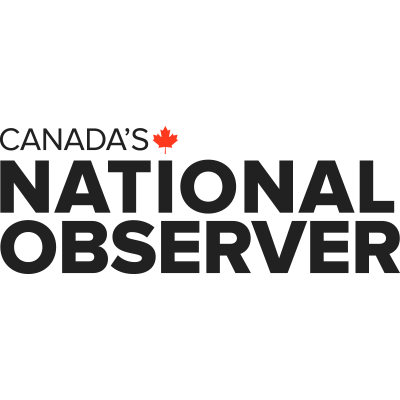Natasha Bulowski, Local Journalism Initiative Reporter, Canada’s National Observer
Down in the polls, the Liberals went on the offensive on Day 2 of the Conservative Party of Canada’s policy convention in Quebec City.
“Frankly, it’s very easy to attack Pierre Poilievre on the environment,” federal Environment Minister Steven Guilbeault said Friday morning. Guilbeault first made a statement in French and then took questions from members of the media outside the Quebec City Convention Centre.
The official leader of the Opposition considers himself a political leader, yet is someone “who does not believe that we should be doing anything about climate change,” he added.
“Yet again, [Thursday] he falsely claimed that Ottawa is working to take away Quebecers’ money to send it to Ottawa on carbon pricing,” said Guilbeault, referring to comments Poilievre made in a speech to caucus members ahead of the convention on Sept. 7.
“This is false,” Guilbeault said with emphasis. The Quebec government has its own robust carbon-pricing system, which Guilbeault said he worked on when he was in the environmental movement in Quebec.
“So false claims, denying science, I mean, we’ve played in that movie before.”
The environment minister also said the Conservatives’ framing of his recent trip to Beijing for a meeting of the China Council for International Cooperation on Environment and Development is misleading.
The minister said his appearance outside the convention was because the Conservatives didn’t invite any Liberal political observers to the event, a courtesy often extended by various parties.
Right now, the Conservatives are up in the polls and Poilievre’s personal ratings are positive, according to Abacus Data’s latest national survey.
“Obviously, the Liberals are under a lot of pressure to send a minister to go out on the attack,” said Alex Marland, a professor of Canadian politics at Acadia University. “They’re worried … they see Poilievre and the Conservatives as a threat. If they did not see them as a threat, then they wouldn’t bother.”
Over the course of the summer, both Poilievre and Prime Minister Justin Trudeau did things to try to change the narrative. Trudeau did a cabinet shuffle, and Poilievre leaned into advertising and “a bit of an image makeover,” said Marland. There’s a lot of other things going on, like housing issues, but at this point, Poilievre is ahead in the polls, which “suggests that whatever the Liberals are doing at the moment, it’s not working, hence the strategy to come out and go on the attack,” he added.
Guilbeault is a logical choice — it “wouldn’t make sense to have somebody from outside Quebec go,” said Marland. Hammering on environment and climate issues also makes sense, given Quebecers are generally more concerned about climate change than those living in other provinces, he added.
Poilievre’s stance on climate change has largely been limited to talk of “technology, not taxation,” with few specifics on exactly what the plan would be, beyond repealing the federal carbon price, approving more oil and gas projects and supporting carbon capture and nuclear.
Aside from a resolution to repeal the federal carbon price, the list of policy resolutions for the Conservatives’ 2023 convention does include a few climate-adjacent items. One submission proposed a statement about promoting alternative energy and transition fuels but was modified to remove references to wind, solar, geothermal, biodiesel and other renewable energy sources. The modified resolution says in a gradual transition to a lower-carbon future, a Conservative government “will support the continued use of oil and gas while encouraging research and development” for “dependable and economical options, including carbon capture technology, battery-based storage, small modular reactors, and hydrogen-based generation.”
Policy resolutions are developed by the party’s grassroots members and then approved by local electoral district associations before being discussed and put to a vote. Policy resolutions aren’t binding, and Poilievre doesn’t have to campaign based on the resolutions passed this weekend.
Poilievre and his staff have yet to answer questions about the party’s climate policy posed by Canada’s National Observer.
In August, his communications team had to cancel a handful of events — often billed as “axe the tax” rallies, in reference to federal carbon pricing — planned in B.C. and Yukon due to wildfires. Canada’s National Observer’s application for media accreditation was denied without explanation by Conservative Party of Canada director of communications Sarah Fischer. Fischer informed Canada’s National Observer of the option to pay $1,700 to attend the 2023 policy convention as a non-member observer. Journalists from The Maple and The Breach were also reportedly denied accreditation.
Outside the Conservative policy convention, Guilbeault was asked why the carbon tax hasn’t stopped extreme events like wildfires and hurricanes.
“This question, which I’ve heard in the House of Commons by many Conservative Party members, including Pierre Poilievre, is yet another example of the fundamental disbelief that you have in climate science and in science, full stop,” said Guilbeault.
“We won’t solve climate change overnight and we certainly won’t solve climate change with empty slogans. It’s going to take years of hard work to tackle this environmental crisis, and the fact that you believe that somehow we can flick a switch on a wall and everything’s going to be fine just shows the total ignorance that you and many others have when it comes to the issue of climate change.”


